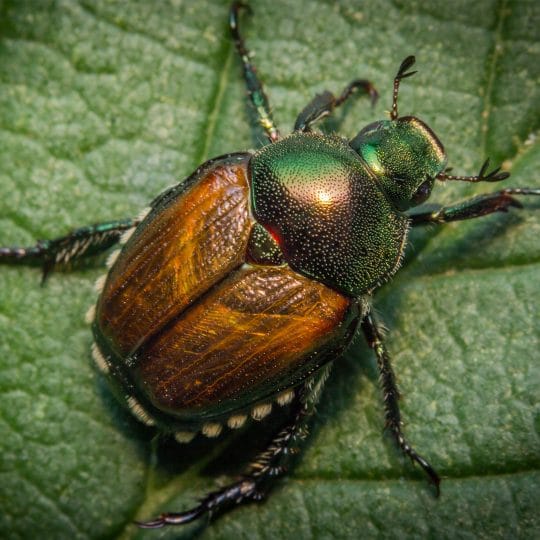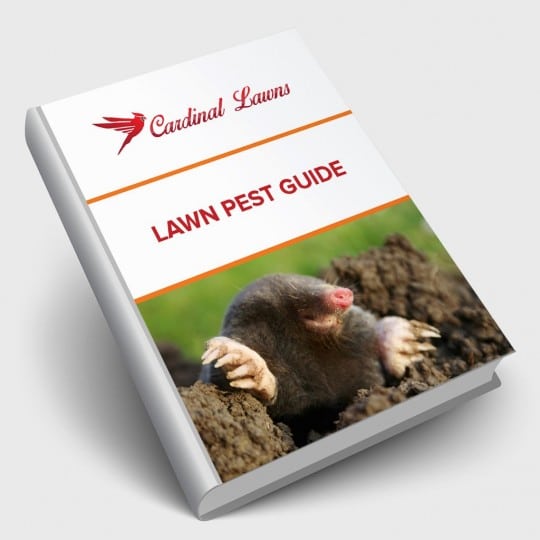Is Japanese Beetle Season Over?
Yes & No
Posted
September 1, 2022

While summer may be winding down, some summertime garden pests continue to get their fill of your yard. Even though you may not see as many Japanese beetles around, it doesn’t mean they’re not there. In fact, this is the time of year when it’s their larvae you need to worry about.
If you noticed beetles around your garden this summer, turn your attention from those skeletonized leaves toward any brown patches of grass where you may find grubs dining on roots. Learn more about the signs of Japanese beetles in their many forms and the many ways to help prevent them throughout the seasons.
Signs of Japanese Beetles
Many gardeners are all too familiar with the Japanese beetle. At almost an inch long, with hard bodies and copper-green color, they’re easy to spot. They tear through the leaves in your garden and leave the veiny skeletons behind. These leaf-lovers prefer roses, hibiscus, and fruit trees, but will settle for cannas and coneflowers.
Japanese beetles typically feast for weeks through June and July. Then when they’re nice and full, they’ll settle on your lawn and lay eggs. This larvae hatch and work their way through the grass roots in the late summer through the fall. This is when you’ll see brown patches pop up across your yard.
Don’t think the winter will kill them either. Once they’re full on grass roots, they’ll dive deeper into your soil to spend the winter months, then reemerge in the spring in beetle form to start the process all over.
Controlling Japanese Beetles & Grubs
There are ways to help prevent the destruction of your plants and grass and control infestations in any form. Of course, the methods vary depending on the current stage of the beetle.
If you spot any Japanese beetles you can weed out the population by:
- Hand-picking. Since they’re easy to find, simply knock them off your plant and drop them into a bucket of soapy water. You’ll probably catch more in the early evening. This may sound morbid, but you can put these containers of caught beetles in the areas they frequent. The smell of dead insects acts as a repellent.
- Traps. Keep in mind that traps are designed to attract beetles, so you’re inviting them into your yard and may not end up killing all the new arrivals. Set up any traps away from their preferred plants. Don’t make it that easy for them to attack.
- Sprays. Many chemical insecticides could kill the plant you’re trying to protect and also harm beneficial bugs in the area. Try starting with an organic product and only turn to a chemical as a last resort.
Now that it’s late summer and you don’t see as many beetles, focus on grub control on your lawn. Since grubs are feeding on the grass toward the surface, it should be easy enough to skewer them by aerating your lawn. This method also works in the spring once the hungry grubs resurface after overwintering.
There are also other natural grub control methods, such as:
- Nematodes. These tiny grub-eating worms can be purchased from specialty shops and applied to your lawn in the fall or spring.
- Birds. Attract birds to your lawn by providing food, shelter, and water and they will return the favor by dining on any grubs they find. Some even eat the beetles.
- Flies. This one doesn’t sound ideal, but if you’re running out of options, attract tachinid flies to your yard with plants such as dill, fennel, and mint. These flies lay their eggs on Japanese beetles. Then when the eggs hatch, the fly larvae will eat the beetle.
Professional Pest Control
No matter whether you’re trying to get rid of beetles or grubs, you have an ally in the fight to save your yard and garden. Contact Cardinal Lawns for more tips and assistance in controlling pests year-round. Don’t let them take over in any season.

Download Your FREE Lawn Pest Guide
Pests become most prevalent during the heat and humidity of summer. Take some time to learn about the signs of infestations before any damage can be caused to your landscape. This handy guide will teach you how to spot common lawn pests and how to keep them from causing harm to you and your property.